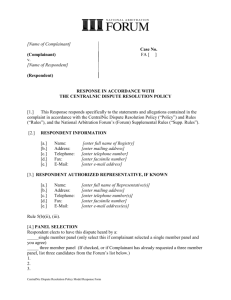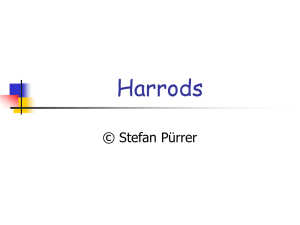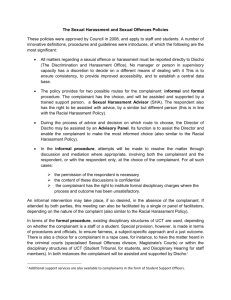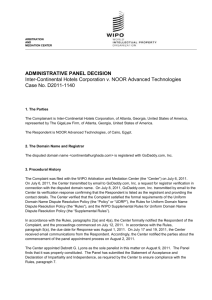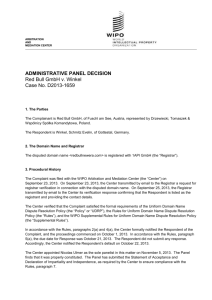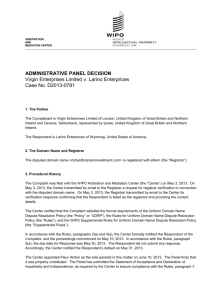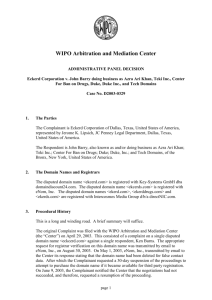WIPO Domain Name Dispute: Case No. D2003-0723
advertisement
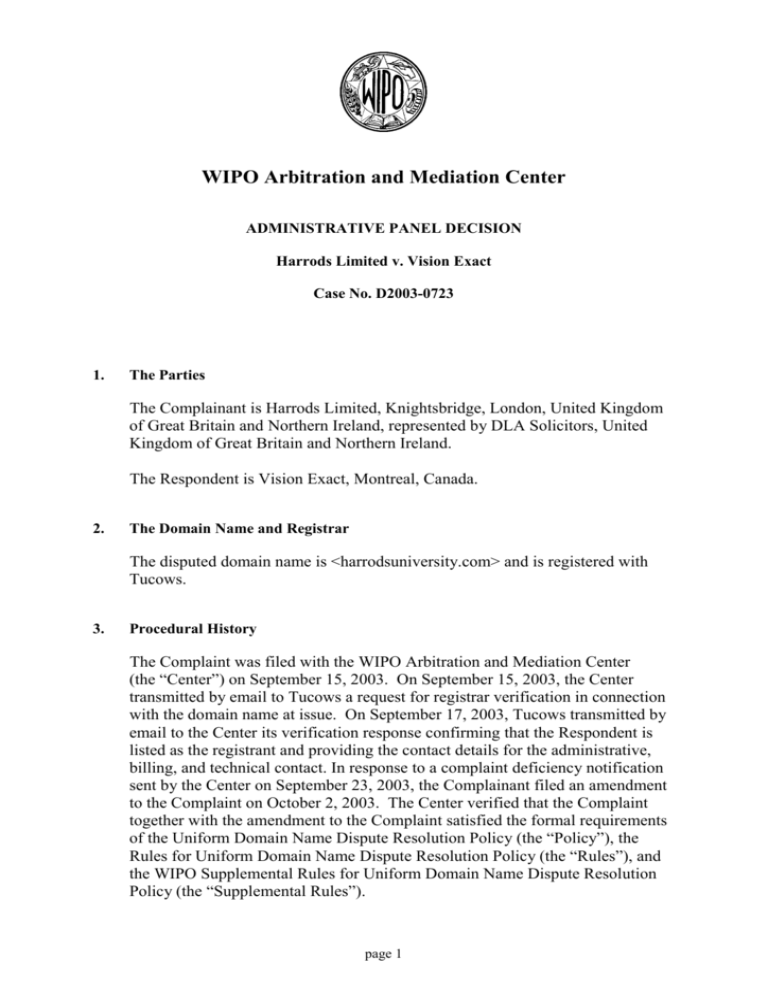
WIPO Arbitration and Mediation Center ADMINISTRATIVE PANEL DECISION Harrods Limited v. Vision Exact Case No. D2003-0723 1. The Parties The Complainant is Harrods Limited, Knightsbridge, London, United Kingdom of Great Britain and Northern Ireland, represented by DLA Solicitors, United Kingdom of Great Britain and Northern Ireland. The Respondent is Vision Exact, Montreal, Canada. 2. The Domain Name and Registrar The disputed domain name is <harrodsuniversity.com> and is registered with Tucows. 3. Procedural History The Complaint was filed with the WIPO Arbitration and Mediation Center (the “Center”) on September 15, 2003. On September 15, 2003, the Center transmitted by email to Tucows a request for registrar verification in connection with the domain name at issue. On September 17, 2003, Tucows transmitted by email to the Center its verification response confirming that the Respondent is listed as the registrant and providing the contact details for the administrative, billing, and technical contact. In response to a complaint deficiency notification sent by the Center on September 23, 2003, the Complainant filed an amendment to the Complaint on October 2, 2003. The Center verified that the Complaint together with the amendment to the Complaint satisfied the formal requirements of the Uniform Domain Name Dispute Resolution Policy (the “Policy”), the Rules for Uniform Domain Name Dispute Resolution Policy (the “Rules”), and the WIPO Supplemental Rules for Uniform Domain Name Dispute Resolution Policy (the “Supplemental Rules”). page 1 In accordance with the Rules, Paragraphs 2(a) and 4(a), the Center formally notified the Respondent of the Complaint, and the proceedings commenced on October 2, 2003. In accordance with the Rules, paragraph 5(a), the due date for Response was October 22, 2003. The Respondent did not submit any response. Accordingly, the Center notified the Respondent’s default on October 31, 2003. The Center appointed Mr. Albert Agustinoy Guilayn as the sole panelist in this matter on November 11, 2003. The Panel finds that it was properly constituted. The Panel has submitted the Statement of Acceptance and Declaration of Impartiality and Independence, as required by the Center to ensure compliance with the Rules, Paragraph 7. On November 25, 2003, the Panel, in accordance with Paragraph 12 of the Rules, issued a Procedural Order requiring the Respondent the filing of clear and undisputed evidences on the existence of the so-called "Harrods University". Moreover, the Complainant was invited to file any supplemental information it could consider of interest in regards of the proceeding. The parties were required to file said supplemental documents within a five-day term that ended on November 30, 2003. Neither the Respondent nor the Complainant filed any supplemental documents. 4. Factual Background The Complainant is a UK private company by shares with its principal place of business in London, England. The Complainant and its predecessors have operated the famous Harrods Department Store located in the Knightsbridge area of London since 1849, having obtained international reputation. The Harrods Department Store provides over one million goods and fifty separate services having become one of the main tourism attractions in London. Moreover, said department store has been promoted internationally for many years and its international reputation has been consolidated by extensive overseas exports, international mail orders as well as the introduction of satellite stores at major international airports and department stores. Currently, the Complainant has extended the use of the HARRODS trademarks to product ranges other than the retail of goods, such as banking, real estate, airlines and online casinos. The Complainant has used, registered or applied to register the trademarks “HARRODS” in many countries around the world (including Canada, where the Respondent seems to be seated) for a wide variety of goods and services. The Complainant’s trademark portfolio includes, inter alia, the following registered trademarks: - UK Trademark No. 1266810 registered on May 10, 1986, for the mark “HARRODS” for various goods in Class 16. - UK Trademark No. 2245927 registered on September 19, 2000, for the mark page 2 “HARRODS” for various services related to telecommunications and the Internet in Class 35. - Community Trademark No. 62414 registered on April 1, 1996, for the mark “HARRODS” for a wide variety of goods and services in Classes 1 to 42. - US Trademark No. 1354693 registered on August 13, 1985, for the mark “HARRODS” for services in Class 42. - US Trademark No. 2115836 registered on November 25, 1997, for a variety of goods in Class 25. As a result of the quality of the Complainant’s goods and services, the volume of its customers and the extensive advertisement and promotion of the HARRODS trademarks, said trademarks have become well-known both inside and outside the United Kingdom. Such an international goodwill and reputation has been confirmed by many previous WIPO decisions (Harrods Limited v. AB Kohler & Co., WIPO Case No. D2001-0544; Harrods Limited v. Harrods Closet, WIPO Case No. D2001-1027; Harrods Limited v. Vineet Singh WIPO Case No. D2001-1162 or Harrods Limited v. Dijitaldjs, WIPO Case No. D2001-1163, for example). Indeed, said decisions have considered the Complainant’s HARRODS trademark as well-known and famous. The Complainant has been active on the Internet for years through the corporate sites of the companies belonging to the Harrods Group. In particular, the Complainant has operated its corporate website (located at ”www.harrods.com”) since February 14, 1999. At present, the online store on said web site provides a wide variety of goods and services. In accordance to the information provided by the WHOIS database, the Respondent seems to be a Canadian company called Vision Exact, with a stated address at Montreal, Quebec. No further information on the Respondent has been provided to the Panel, as it has not filed a response to the Complaint. The disputed domain name <harrodsuniversity.com> was registered by the Respondent on April 7, 2003, with Tucows, Inc. Currently, <harrodsuniversity.com> is linked to a web site of a supposed US university named ‘‘Harrods University’’. According to the information posted on said site, "Harrods University" is located at Wailuku, Hawaii and it offers distant-education services, including Undergraduate, Graduate, MBA and Ph. D. Programs. Nonetheless, the Complainant has indicated the Panel that, after contracting the services of a private investigator, it has not been able to confirm the existence of ‘‘Harrods University’’. Indeed, according to the Complaint, such a university does neither appear on the list of existing US universities nor the contact data posted on the web site seem to be true. Moreover, after printing the web pages corresponding to the sections of the web site linked to <harrodsuniversity.com>, the Panel has noticed that some of the headers in the printout copies included references to the University of North Washington. Actually, after reviewing the web site belonging to the above-mentioned university (located at “www.unw.edu”), the Panel has been able to find out that many of the texts included on the web site linked to the disputed domain name have been copied from the web site belonging to the University of Northern Washington. page 3 In order to clearly set out the existence or not of "Harrods University", on November 25, 2003, the Panel issued a Procedural Order requiring the Respondent to file clear and undisputed evidence of the existence of said university. The Respondent did not respond anyhow to said order. 5. Parties’ Contentions A. Complainant The Complainant contends that: - The disputed domain name is confusingly similar to the HARRODS trademarks on which the Complainant has rights; and The Respondent has no rights or legitimate interests in respect of the disputed domain name; and The Respondent registered and uses the disputed domain name in bad faith. - As a consequence of the above-mentioned findings, the disputed domain name <harrodsuniversity.com> should be transferred to the Complainant. B. Respondent The Respondent did not file any response to the Complaint and did not reply anyhow to the Complainant’s contentions. Moreover, as stated above, the Respondent did not respond in any way to the Panel’s Procedural Order issued on November 25, 2003, requiring it to file clear and undisputed evidence on the actual existence of "Harrods University". 6. Discussion and Findings In accordance to Paragraph 4(a) of the Policy, the Complainant must prove the Panel the concurrence of three circumstances in order to obtain the transfer of the disputed domain names. Said circumstances are the following ones: (i) To prove that the disputed domain names are identical or confusingly similar to a trademark or service mark in which the Complainant has rights; (ii) To prove that the Respondent does not hold rights or legitimate interests in respect of the disputed domain names; (iii) To prove that the disputed domain names have been registered and are being used by the Respondent in bad faith. Consequently, the Panel shall further analyze the concurrence or not of the abovementioned circumstances in the present case. A. Identical or Confusingly Similar page 4 The first circumstance that must be given is that the disputed domain name may be considered as identical or confusingly similar to the HARRODS marks on which the Complainant holds rights. The comparison between the disputed domain name and the Complainant’s trademarks shows two main differences between them: - <harrodsuniversity.com> is composed by the mark HARRODS combined with the generic term “university”. - The domain name does include the “.com” suffix. In regards of the first difference, the Panel considers that the disputed domain name clearly relates to the HARRODS mark, as in the disputed domain name the generic term (“university”) is just a complement to the HARRODS mark. Thus, the disputed domain name could lead the Internet users to confusion (at least at a first moment), due to the inclusion of a well-known trademark combined with a generic term. This approach has been applied by many decisions adopted under the Policy such as, for example Playboy Enterprises International, Inc. v. Sookwan Park, WIPO Case No. D2001-0778; Adaptive Molecular Tech., Inc. v. Woodward, WIPO Case No. D2000-0006 and Dell Computer Corporation v. MTO C.A. and Diabetes Education Long Life, WIPO Case No. D2002-0363. Moreover, such a test of confusion must be specially strict when Complainant is the owner of a “family” of trademarks. Said risk of confusion does increase in the present case as, according to what it has been stated above, the HARRODS trademarks are related to a vast variety of goods and services. Consequently, the Panel considers that the disputed domain name creates somehow the appearance that the Complainant has registered or has permitted the registration and use of the disputed domain name or at least the Complainant does support or endorses its use by the Respondent. The second difference between the HARRODS trademarks and the disputed domain names is the inclusion of the “.com” suffix in the latter ones. Such an inclusion is due to the current technical specificities of the domain name system. Therefore, said difference should not be taken into account in order to evaluate the identity or similarity between the disputed domain names and the Complainants’ trademarks (see, for example, New York Insurance Company v. Arunesh C. Puthiyoth, WIPO Case No. D2000-0812 or A & F Trademark, Inc., Abercrombie & Fitch Store, Inc., Abercrombie & Fitch Trading Co., Inc. v. Party Night, Inc. et al., WIPO Case No. D2003-0172). As a consequence of what it has been stated, the Panel considers that the disputed domain name is confusingly similar to the “HARRODS” trademarks owned by the Complainant. Therefore, the Panel considers that the condition set out by Paragraph 4(a)(i) of the Policy has been met by the Complainant. B. Rights or Legitimate Interests In second place, Paragraph 4(a)(ii) of the Policy requires that the Respondent does not hold rights or legitimate interests on the disputed domain names. At this regard, Paragraph 4(c) of the Policy foresees a set of circumstances where the Respondent may be considered as holding said rights or interests. Those circumstances are: - To have used the disputed domain name or to have made demonstrable page 5 preparations for its use before any notice of the dispute in connection with a bona fide offering of goods and services; or - To have been commonly known by the disputed domain name, even when no trademark or service mark right has been acquired; or - To make a legitimate non-commercial or fair use of the disputed domain name, without intent for commercial gain to misleadingly divert consumers or to tarnish the trademark or service mark at issue. In the present case, none of the above-mentioned circumstances seems to apply. Indeed, the Respondent has not filed any document before the Panel, even when it has been specially required to do so by means of a Procedural Order issued by the Panel. Such a passive attitude seems to prove its clear absence of rights or legitimate interests on the disputed domain names or at least his lack of interest in demonstrating the contrary. In relationship with this circumstance, many decisions adopted under the Policy (see, for example Berlitz Investment Corp. v. Stefan Tinculescu, WIPO Case No. D20030465 or Adventis Pharmaceuticals Products, Inc. v. Nejat, WIPO Case No. D20030401), have stated that by defaulting and failing to respond, the Respondent fails to offer the Panel evidences of any of the circumstances foreseen by Paragraph 4(c) of the Policy or any other aimed at providing the Panel evidences of his rights or legitimate interests on the disputed domain name. The panel considers that this approach is fully applicable to the present case. Indeed, the Respondent has not refuted any of the evidences provided by the Complainant in regards of his lack of rights or legitimate interests on the disputed domain name. It is also important to remind that, as stated before, “HARRODS” may be considered as a well-known trademark. Therefore, it is quite unlikely that a “coincidence” has been given in the present case. On the contrary, it seems that the Respondent was clearly aware of the existence of the Complainant’s trademarks and did not register the disputed domain name for other purposes than to include the Complainant’s trademarks in said domain name. In consequence, the Panel considers that the Respondent does not hold rights or legitimate interests on the disputed domain names and that the second condition set out by the Policy has been met by the Complainant. C. Registered and Used in Bad Faith The last of the elements foreseen by Paragraph 4(a) of the Policy is that the Complainant proves that the Respondent has registered and uses the disputed domain names in bad faith. In regards of this issue, it is important to remind that both conditions are cumulative, as stated in many decisions adopted under the Policy (World Wrestling Federation Entertainment, Inc. v. Michael Bosman, WIPO Case No. D1999-0001 or Robert Ellenbogen v. Mike Pearson, WIPO Case No. D2000-0001, for example). Consequently, the Complainant must clearly show that: (i) the disputed domain name was registered by the Respondent in bad faith, and, (ii) the disputed domain name has been used by the Respondent in bad faith. Further, the eventual concurrence of said circumstances in the present case shall be page 6 analyzed. Registration of the disputed domain name in bad faith First of all, the Complainant must prove that at the moment of registering the disputed domain name, the Respondent was guided by bad faith purposes. At this regard, once again it is important to remind that, due to its extensive advertising campaigns and the shipment of orders of goods both to the US and Canada (where both ‘Harrods University’ and the Respondent seem to be located), “HARRODS” is a well-known trademark in said territories. Moreover, the Respondent has repeatedly failed to file any argument before the Panel in order to prove its good faith and has not denied a single allegation made against it by the Complainant. Consequently, it seems quite clear that, given the above-mentioned circumstances, the only feasible possibility seems to be that the Respondent registered the disputed domain name in order to unfairly benefit from the Complainant’s trademarks. Use of the disputed domain names in bad faith In order to evaluate the existence of said bad faith, Paragraph 4(c) of the Policy must be taken into account. Said paragraph states: “For the purposes of Paragraph 4(a)(iii), the following circumstances, in particular but without limitation, if found by the Panel to be present, shall be evidence of the registration and use of a domain name in bad faith: (i) circumstances indicating that you have registered or you have acquired the domain name primarily for the purpose of selling, renting, or otherwise transferring the domain name registration to the complainant who is the owner of the trademark or service mark or to a competitor of that complainant, for valuable consideration in excess of your documented outof-pocket costs directly related to the domain name; or (ii) you have registered the domain name in order to prevent the owner of the trademark or service mark from reflecting the mark in a corresponding domain name, provided that you have engaged in a pattern of such conduct; or (iii) you have registered the domain name primarily for the purpose of disrupting the business of a competitor; or (iv) by using the domain name, you have intentionally attempted to attract, for commercial gain, Internet users to your web site or other on-line location, by creating a likelihood of confusion with the complainant's mark as to the source, sponsorship, affiliation, or endorsement of your web site or location or of a product or service on your web site or location.” Moreover, many decisions adopted under the Policy have considered that the list of circumstances foreseen by the above-mentioned paragraph is not based on a numerus clausus basis, but it is open (See, for example, Home Interiors & Gifts, Inc. v. Home Interiors, WIPO Case No. D2000-0010; Audi AG v. Hans Wolf, WIPO Case No. D2001-0148 or Wal-Mart Stores, Inc. v. Su Rong Ye, WIPO Case No. D2002-0771). For that reason, any other circumstance that may give the Panel clear evidences of the Respondent’s bad faith must also be taken into account. page 7 In accordance with the evidence provided by the Complainant and the lack of answer by the Respondent, it seems quite clear that "Harrods University" does not really exist. Actually, no educational services at all are provided by means of the web site linked to the disputed domain name. Such a conclusion is confirmed when, after analyzing the web site linked to the disputed domain name the following facts are given: - The Respondent has included false contact data in the web site linked to the disputed domain name. Indeed, as stated before, the postal address corresponding to the supposed location of the university does not seem to be true. Moreover, none of the e-mail addresses included on said site for contacting the university are operative. - As stated above, the only operative sections of the web site linked to the disputed domain name include contents that have been actually copied from a web site belonging to a third party. The rest of the sections of said site are not operative. Thus, it seems that the web site linked to the disputed domain name just offers a false appearance of fair use (by hosting the web site of a supposed US university). Nonetheless, in this case it is clear that such a fair use is false. Indeed, as stated above, "Harrods University" does not seem to exist. Therefore, it is quite unlikely that the disputed domain name may be used in good faith when the services to be rendered through it do not exist. In this regard, the Panel notes that the Respondent has not filed any kind of argument in order to prove its legitimate rights on the disputed domain name as well as its fair registration and use. Such a lack of response leads the Panel to conclude that the Complainant has been able to prove prima facie that the Respondent registered and has used the disputed domain name in bad faith, fulfilling the requirements set out by Paragraph 4(a)(iii) of the Policy. 7. Decision For all the foregoing reasons, in accordance with Paragraphs 4(i) of the Policy and 15 of the Rules, the Panel orders that the domain name <harrodsuniversity.com> be transferred to the Complainant Albert Agustinoy Guilayn Sole Panelist Dated: December 2, 2003 page 8
